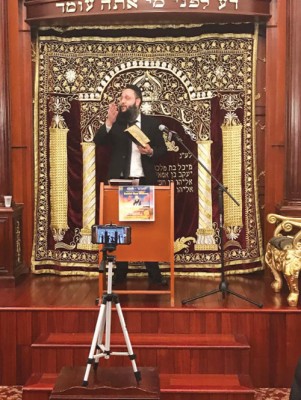

On Sunday evening, April 8, Rabbi Ilan Meirov delivered a beautiful shiur in memory of Emanuel ben Zina (Emanuel Kakuriev) and Shlomo Kakuriev. It was sponsored by Yonatan Kakuriev, the son of Emanuel, at Congregation Beit Eliyahu in Hillcrest, and was hosted by Chazaq and Congregation Beit Eliyahu. Rabbi Meirov’s passion and genuine caring about the community shone through as he talked straight from the heart, urging everyone in the audience to bring more Torah learning into their lives and into the community.
Rabbi Meirov began by explaining how powerful it is to dedicate a shiur in memory of someone. He directed a message to the son of Emanuel ben Zina. “Yonatan, you are a role model for the community. This is the best way to honor the memory of a parent.” Rabbi Meirov noted that in Pirkei Avos we learn that you should look at three things and you won’t come to sin.Those three things are where you came from, where you are going, and before Whom you will receivejudgment and accountability. Rabbi Meirov pointed out that in a human court there is first the case, which examines the person’s accountability, and then a judgment is decreed. In the heavenly court, we see the judgment is given and then the accountability follows.“Everything Hashem does is perfect,” Rabbi Meirov stated. He explained that after a person dies, there is judgment every year, and in Heaven they do a new accounting. Therefore, it is so important to sponsor a shiur in someone’s memory. “Tonight in Shamayim, this n’shamah is getting a lot of points,” Rabbi Meirov said. The Ben Ish Chai posed the question of how long a yahrzeit should be observed, and he taught that there is no limit or end. Even if children live to 120 years of age, they should continue to observe the yahrzeit of a parent. He must light candles, give tz’dakah, and learnTorah in their memory.
Rabbi Meirov went on to explain: “A n’shamah doesn’t complete aliyah in one shot. Rather it goes up in stages.” Rabbi Meirov then shared valuable ideas from Pesach that we can bring with us into our lives, now that the holiday is over. He pointed out that we read in the Haggadah about five great rabbis who stayed up all night, learning and talking about the story of leaving Egypt. Rabbi Meirov explained how each of these rabbis represents a different part of society. One was very poor, one was very wealthy, one didn’t learn Torah until he was older, and one was a child prodigy.They were all different but they all achieved greatness.This teaches us that each of us, no matter where we came from, has the potential for greatness. Rabbi Meirov stressed, “If there is a will there is a way.Everyone here can become the best you can become.The only way you can do this is if you believe in yourself,” he stated.
Rabbi Meirov addressed the women. “You can guide the head of the house in a certain direction. It’s your responsibility to encourage your husband and your sons to go learn Torah.” He then shared the beautiful story of Rabbi Akiva’s wife, Rachel, who saw the potential of Rabbi Akiva in his modesty and midoseven though he knew nothing about Torah. Rachel agreed to marry him on the condition that he would learn Torah. Rabbi Akiva told his 24,000 students that everything he has and everything they have is in her merit. Rabbi Meirov re-emphasized the importance of women encouraging their husbands to learn Torah.“Ladies, you have the power to give a push to give encouragement to your sons and husband to learn Torah.”
Rabbi Meirov continued. “How many sports can we watch? How many times can we watch the news? We need someone to step up to the plate and be Nachshon and say we are going to have learning groups every night in this community. Then you will see so much shalom bayis and simchah and brachah.”
He taught that Torah is giving us a purpose in life.Rabbi Meirov lamented, “Everyone has great excusesfor not going out to learn Torah: I wasn’t brought up religious, I was born in Russia, etc.”
He taught that the Haggadah teaches us Jewish history.It speaks about Terach, the father of Avraham, who was an idol worshipper. It also speaks about Yishmael, the son of Avraham. “Why should we tell our children about bad people?” Rabbi Meirov asked. He then emphasized: “Avraham did not use his father’s deficiency as an excuse not to grow.”
Avraham had two sons: One was a righteous man and one was a wicked man. “There are no guarantees in life,” Rabbi Meirov stated. Rabbi Meirov stressed the importance of having a relationship with your child.“You need to talk to your child every day. You should know who his friends are.” He explained that if you never talk to your child, then you can’t expect him to talk to you when he is a teenager. “There has to be a connection between the parent and child every day. It is so important to build a relationship with your child.”He stated that you have to pray and work hard to have children who are righteous.
Rabbi Meirov concluded with the message of Pesach.“Keep building more Torah and connect with your children. That is the message of Pesach and of Judaism.” He gave everyone in the audience a brachahthat they should have shalom bayis and that their children should go the way of Torah.
By Susie Garber
A Night Of Inspiration With Rabbi Ilan Meirov
Typography
- Smaller Small Medium Big Bigger
- Default Helvetica Segoe Georgia Times
- Reading Mode


